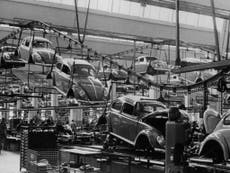VW emissions crisis shows going green won’t be easy
We can and we should deplore the weakness of the political will, in this country as in the United States and other rich countries, in dealing with the problem of urban air quality
The VW crisis shows we should be wary of technological fixes that seem to take a short cut through the laws of science
The Volkswagen test-cheating scandal is an ominous warning for those attempting to mitigate global warming. The paradox is that diesel was once seen as a greener fuel because it produces less carbon dioxide than petrol, and carbon dioxide is the main cause of climate change. The problem with diesel engines is that they produce more local pollution, mainly particulates – tiny drops of unburnt fuel – and nitrogen oxides. And these cause breathing difficulties.
The aim of governments was to require vehicle-makers to clean up diesel exhaust, so that their more efficient engines could make a contribution to reducing the output of carbon dioxide from road traffic. One of the lessons of VW’s disgrace is that this technological fix came up against the laws of physics. It would seem that meeting air-quality standards reduces an engine’s efficiency so much that the only way VW felt they could make commercially viable vehicles was to cheat the emissions tests.
It does not need saying that such corporate dishonesty is deplorable. But the reason it does not need saying is that VW is now suffering such damage to its reputation and thereby balance sheet, it should be clear that it was not in its interest to try to defeat the regulations.
We can and we should deplore the weakness of the political will, in this country as in the United States and other rich countries, in dealing with the problem of urban air quality. One of our regrets at the departure of Liberal Democrat ministers from the Government is that Ed Davey, the former climate change secretary, was planning to make a big thing of air quality in this parliament. Instead, the Conservatives have been allowed to retreat further from their green ambitions. The Department for Environment, Food and Rural Affairs, which is responsible for air quality and which recently launched a consultation on the subject, has become so feeble that there has been speculation it might be abolished.
However, that VW has been found out and has admitted its deception means it is reasonable to hope that diesel pollution will now be dealt with. Air quality in big cities has been getting worse when it should be getting better, and now we know why. We should, therefore, focus on the bigger problem of climate change. The underlying significance of the VW crisis is that we should not be too ready to believe in technological fixes that seem to take a short cut through the laws of science.
That, too, is the importance of last week’s announcement that Drax coal-fired power station was abandoning its experiment with carbon capture and storage. This is another technological promise that seems too good to be true: that it is possible to capture the carbon dioxide produced by burning fossil fuels and store it, under pressure, underground. Drax blames the cut in government subsidy, but the real problem is probably much simpler: burying the carbon dioxide is itself an energy-intensive process.
All this means that the Paris summit on climate change later this year should prioritise proven technologies, especially renewable energies such as nuclear, wind and solar power. The cost of solar, in particular, has been falling dramatically. While Joan Smith is right, on page 42, to warn against legitimising China’s human rights abuses, the agreement between China and the US on climate change is welcome, and is a reason for cautious optimism.
The VW scandal, meanwhile, contains two vitally important lessons for world leaders when they assemble in Paris at the end of November to discuss climate change: that effective regulation requires strong political will – and that we should be sceptical of technological fixes which seem too good to be true.




Join our commenting forum
Join thought-provoking conversations, follow other Independent readers and see their replies